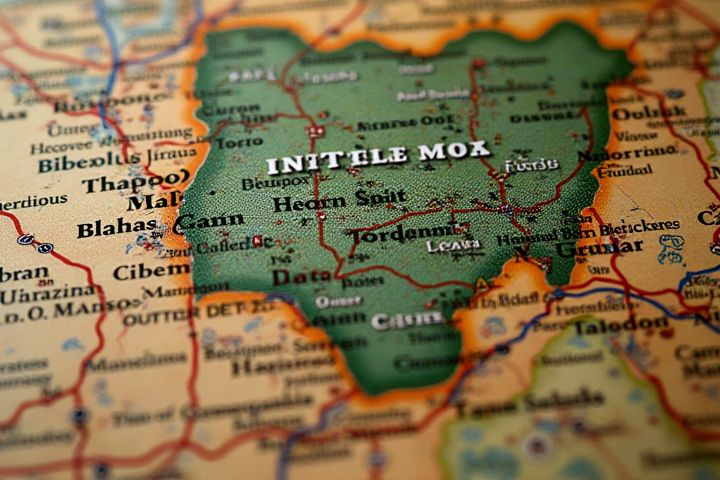
Nigeria is one of the most linguistically diverse countries in the world, with over 500 distinct languages spoken across its regions. The three major languages are Hausa, Igbo, and Yoruba, each representing significant ethnic groups and cultures. In addition to these, English serves as the official language, facilitating communication in government, education, and business. Niger-Congo languages dominate the southern regions, while Afro-Asiatic languages are prevalent in the north. Understanding this linguistic landscape is essential for effective communication and cultural appreciation within Nigeria.
Over 500 languages spoken
Nigeria is home to over 500 diverse languages, reflecting its rich ethnic and cultural mosaic. The three most prominent languages--Hausa, Yoruba, and Igbo--serve as lingua francas in different regions, facilitating communication among diverse groups. Each language carries unique dialects, idioms, and cultural nuances that contribute to Nigeria's identity. Understanding these languages can enhance your appreciation of the country's heritage and foster deeper connections with its people.
English as official language
Nigeria recognizes English as its official language, serving as a unifying medium of communication in a country with over 500 indigenous languages. This linguistic diversity reflects the rich cultural heritage of its various ethnic groups, including the Hausa, Yoruba, and Igbo. English facilitates diplomatic relations, education, and business opportunities both nationally and internationally, enhancing accessibility to global resources. Understanding this linguistic landscape is essential for effective interaction within Nigeria's multifaceted society.
Hausa, Yoruba, Igbo as major languages
Hausa, Yoruba, and Igbo are the three dominant languages in Nigeria, reflecting the country's rich cultural diversity. Hausa, prevalent in the northern regions, is known for its extensive reach, serving as a lingua franca in West Africa. Yoruba, predominantly spoken in the southwest, showcases a vibrant tradition of oral literature and music. Igbo, primarily found in the southeastern states, boasts a complex system of tonal variations that enhances its expressive quality.
Pidgin English widely used
In Nigeria, Pidgin English serves as a crucial lingua franca, facilitating communication across diverse ethnic groups. This creole language has evolved from English, incorporating elements from various indigenous languages, making it a vibrant part of Nigerian culture. You can find Pidgin English in everyday conversations, music, and popular media, illustrating its importance in social interactions and national identity. The linguistic blend exemplifies Nigeria's rich cultural tapestry, highlighting the adaptability and resilience of its people in fostering unity amidst diversity.
Minority languages at risk of extinction
Nigeria is home to over 500 distinct languages, with many minority languages facing the threat of extinction due to globalization and urbanization. Ethnolinguistic diversity is rich in regions such as the Middle Belt and the Niger Delta, where languages like Ikoto and Nimbia are spoken. Language preservation initiatives, including community-based programs and educational resources, play a crucial role in revitalizing these endangered tongues. Your awareness and engagement in supporting these minority languages can significantly contribute to their survival and cultural heritage.
Multilingual education challenges
Nigeria is a tapestry of over 500 languages, making multilingual education both a necessity and a challenge. The linguistic diversity can lead to difficulties in curriculum development, as educators must balance teaching in both indigenous languages and the official language, English. Inadequate resources and trained teachers further complicate the implementation of effective multilingual programs. Addressing these challenges is essential for improving literacy rates and ensuring that students can thrive in a culturally rich and diverse educational environment.
Language influences cultural identity
Nigeria boasts over 500 indigenous languages, each contributing to the nation's rich cultural tapestry and diverse identities. Major languages like Hausa, Yoruba, and Igbo not only facilitate communication but also embody traditional beliefs, historical narratives, and social practices. The interplay between language and culture in Nigeria shapes community bonds, influences social structures, and fosters a sense of belonging. For you, understanding these languages can deepen your appreciation of Nigeria's multifaceted heritage and enhance your connection to its vibrant cultures.
Code-switching common in conversations
In Nigeria, the rich tapestry of languages encourages frequent code-switching during conversations, where speakers fluidly switch between different languages or dialects. This phenomenon reflects the country's diverse linguistic landscape, with over 500 indigenous languages, including Hausa, Yoruba, and Igbo, each deeply embedded in cultural identity. Code-switching often enhances expression, allowing individuals to convey nuanced meanings, emotions, and contextual relevance in social interactions. By adapting language use to fit various contexts, you can better connect with others and navigate Nigeria's vibrant multicultural environment.
Ethnolinguistic diversity impacts politics
Nigeria boasts over 500 distinct languages, reflecting its rich ethnolinguistic diversity that significantly shapes the nation's political landscape. Each language is often tied to specific ethnic groups, influencing political representation and power dynamics within various regions. The multilingual environment fosters both unity and tension, as linguistic differences can lead to regional disparities in governance and resource allocation. Understanding this intricate relationship between language and politics is essential for addressing the challenges of national cohesion in Nigeria.
Language mission for cultural preservation
Nigeria is home to over 500 distinct languages, reflecting its rich cultural diversity and heritage. Organizations and communities actively promote language preservation initiatives, which are crucial for safeguarding indigenous knowledge and cultural practices. Language missions often include creating educational programs and resources that encourage younger generations to learn and use their native languages. By participating in these efforts, you contribute to the longevity of Nigeria's linguistic landscape and the celebration of its unique cultural identity.
